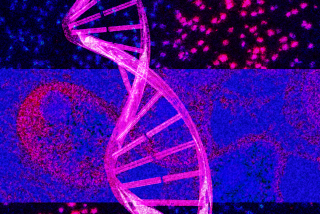The dangers of growing DNA databases
President Obama may have given credence to a relatively new but questionable law enforcement practice that the rest of the developed world is starting to shun: taking and retaining DNA samples from individuals arrested for a crime but not convicted. That is, putting innocent people’s DNA in criminal databases.
During an interview with the president last month on the television program “America’s Most Wanted,” host John Walsh enthusiastically supported the expansion of this practice in the United States, saying, “We now have 18 states who are taking DNA upon arrest. England has done it for years. It’s no different than fingerprinting or a booking photo.” To which President Obama said, “It’s the right thing to do.”
But many in the human rights community disagree. For example, the European Court of Human Rights unanimously ruled in 2008 that the United Kingdom’s policy of keeping arrestees’ genetic samples after their release -- the very practice that Walsh (and by implication Obama) endorses -- violates a right respecting private and family life codified by the European Convention on Human Rights. At the time of the decision, the U.K. database included more than 4.5 million DNA profiles -- more than 5% of its population. One-fifth of these profiles were taken from people without a criminal record.
The court’s reasoning was fairly straightforward: When a person has not been convicted, genetic profiles may contain so much personal information -- ancestry, familial relationships, etc. -- that governments should not be allowed to hold and analyze them indefinitely.
Technically, this ruling applies only to the U.K and other jurisdictions bound by the court’s decision. But the practice raises similar legal concerns under U.S. law as its use is growing among state and federal law enforcement agencies.
At the federal level, U.S. Justice Department policies are expanding to allow law enforcement to collect and retain DNA profiles from all detained immigrants and persons arrested for federal crimes. This will add an estimated 1.2 million people -- many of whom are likely not to have been convicted of a crime -- to the national database each year.
But the most radical and consequential changes are occurring at the state level. At first, only a handful of smaller states authorized retaining DNA profiles from all felony arrestees. But California’s Proposition 69, passed in 2004 with an arrestee provision taking effect in 2009, allows DNA collection and retention from anyone arrested for a felony, whether they are later convicted or not.
As the most populous state in the nation and its most influential laboratory of policymaking, California is poised to become an anti-human rights trailblazer. And with both federal and state databases, it’s quite burdensome for innocent people to have their DNA removed from the files.
Advocates of expanding criminal databases argue that including innocent people’s DNA protects communities and saves lives. This is the “more the merrier” approach to crime fighting: The more DNA profiles in a database, the more likely a sample left at a crime scene might find a match that leads to an arrest. As for being innocent, there’s nothing to worry about if you don’t plan on doing anything wrong, right? Or as Walsh argues, it’s no different than taking a booking photo.
Not so fast. DNA forensics is both an art and a science. It involves complex statistical calculations and requires extremely careful handling to prevent errors; sample contamination and other problems have been well documented. While any two genetic profiles can be matched with a high degree of certainty, large forensic database scans have led to perplexing results.
Take, for example, a 2005 examination of Arizona’s criminal database. The entire enterprise of DNA databases is based on the idea that no two people share the same profile. But Arizona’s database of 65,000-plus entries was shown to have more than 100 profiles that were similar enough for many experts to consider them a “match.”
In separate studies, it has been reported that Illinois’ and Maryland’s databases had hundreds of seemingly unique genetic profiles matching one another. This is a phenomenon that suggests people convicted solely on evidence from DNA databases may have profiles that coincidentally match the real perpetrators’, leading innocent people to be incarcerated. Or worse.
How is this possible? We simply don’t know, in part because state and federal officials have stonewalled scientists’ request to study these databases.
The bottom line is, as UC Berkeley law professor Erin Murphy said in a 2008 article, “We’re putting too much faith in a new technology whose limitations and uncertainties we don’t yet fully understand.”
But the question is not only how many people this policy shift might affect, but which ones? Policies that expand DNA databases are almost sure to exacerbate racial bias in the criminal justice system. The grossly disproportionate number of imprisoned blacks and Latinos reflects, in part, the disproportionate policing of their communities.
Although blacks make up only about 13% of the population, estimates show that they constitute at least 40% of the federal DNA database. Including arrestees who are not convicted will only widen such disparities.
The U.S. criminal justice system is notorious for its long list of practices that others in the developed world consider to be blatant human rights violations. Our zealous pursuit of criminals must be balanced with respecting human rights.
The president’s support for expanding DNA databases to include arrestees who are not convicted and are later released may not only run counter to a growing international consensus concerning human rights, but also against America’s long-standing commitment that people are innocent until proven guilty. This includes the basic idea that government shouldn’t constantly look over innocent people’s shoulders. Or in this case, their genes.
Osagie K. Obasogie is an associate professor of law at UC Hastings College of the Law in San Francisco, a visiting scholar at UC San Francisco and a senior fellow at the Center for Genetics and Society in Berkeley.
More to Read
Sign up for Essential California
The most important California stories and recommendations in your inbox every morning.
You may occasionally receive promotional content from the Los Angeles Times.










